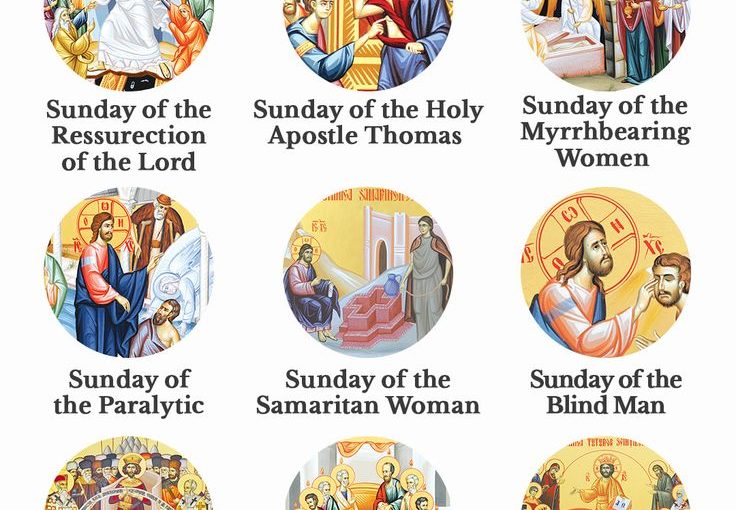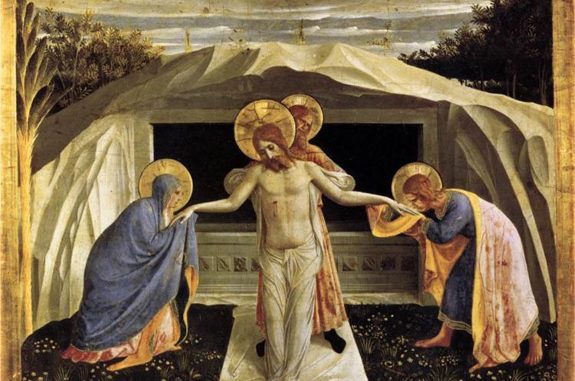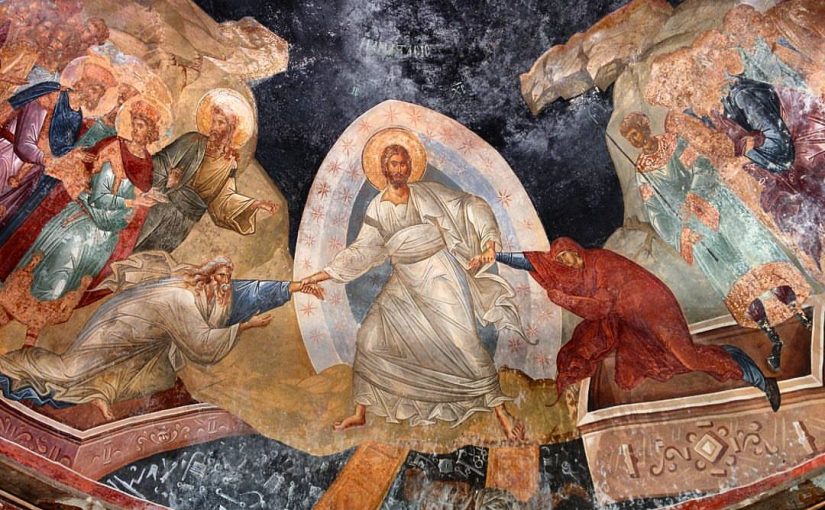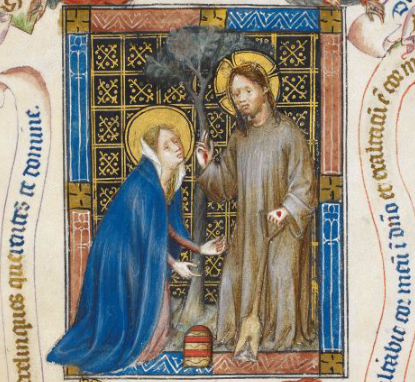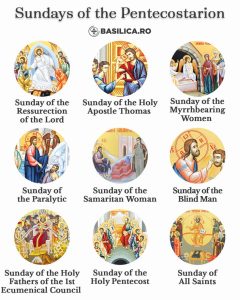 The Pentecostarion lasts 8 weeks from Sunday of the Resurrection of the Lord to the First Sunday after the Pentecost or Sunday of All Saints.
The Pentecostarion lasts 8 weeks from Sunday of the Resurrection of the Lord to the First Sunday after the Pentecost or Sunday of All Saints.
Category: Easter, Ascension & Pentecost
Sunday of the Paralytic Man 2024
In speaking about the liturgical contours of today’s commemoration, Fr David Petras uses St. John Chrysostom to draw our attention deeper into the mystery we are presented in the Gosepl. Chrysostom “tells us that if an unbeliever enters a church during a baptism, all he sees is people being washed. But a believer sees people being reborn in the Spirit. The unbeliever sees only with the eyes of the body, the believer sees with the inner eyes of the soul. When we are baptized all our body sees and feels is water, but by the Spirit our sins are washed away and we become children of God.”
Why Chrysostom identifies for us applies to all of the spiritual life and the sacraments of the Church. For example, when we receive Holy Communion, if we only see and taste with the eyes and mouth bread and wine but not with the eyes of the Holy Spirit we will miss on the fact of the Lord’s love, forgiveness of sins and and healing and the deepest reality of salvation. The Mystery of the bread of life is more than a social pact or a sense of social respectability. Receiving the Eucharistic Lord is communion with the God and with one another as it is the divine pledge of eternal life: new life.
The Sunday of the Paralytic Man teaches us that the water of Bethesda is meaningless if we neglect the fact the word given by Jesus is full of power and energy to transform thus identifying the presence of God. Jesus speaks the word and gives the man the strength to walk.
The water of the Bethseda pool is a type of Baptism. The waters of Baptism not only wash and make us adopted children of God. The waters of Baptism heals us spiritually and physically. One aspect of today’s Gospel is that illness is “a lesser manifestation of death. Here Jesus’s word exercises power over the man’s illness pointing our attention once again to his own power over death.
What do we learn on this 3rd Sunday after Pascha? What is the take-away lesson? First, we don’t make ourselves. Everything we have and are is given and sustained by God. Second, our identity as Christians is based not on a theory or a vague theological idea but on the person of Jesus the Christ. Third, we learn that by ourselves we cannot forgive, heal or love or be saved. Human nature can’t forgive without the prompting of the Holy Spirit.
On Wednesday, April 24, we are mid-way to Pentecost. The Gospels we read at the Divine Liturgy bring our focus of faith into greater clarity as we approach the solemn feast of Pentecost.
Christ is risen!
The thirst we have is satisfied by the Lord
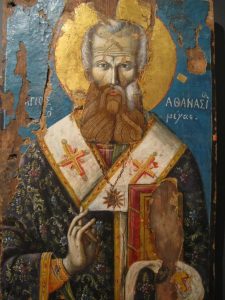 As move closer to the intensity of Holy Week we begin to refocus our spiritual eyes and hearts on what it means to be people of great, and holy desire by attending to the work the Lord has done for us. We are indeed people who thirst. We are people who desire to be in friendship with the Lord of Life who alone satisfies the needs of our hearts. The following portion of the Letter of the great bishop Athanasius iterates what we need, who we are, and what we are doing.
As move closer to the intensity of Holy Week we begin to refocus our spiritual eyes and hearts on what it means to be people of great, and holy desire by attending to the work the Lord has done for us. We are indeed people who thirst. We are people who desire to be in friendship with the Lord of Life who alone satisfies the needs of our hearts. The following portion of the Letter of the great bishop Athanasius iterates what we need, who we are, and what we are doing.
From an Easter letter by Saint Athanasius, bishop
The Paschal sacrament brings together in unity of faith those who are far away
Brethren, how fine a thing it is to move from festival to festival, from prayer to prayer, from holy day to holy day. The time is now at hand when we enter on a new beginning: the proclamation of the blessed Passover, in which the Lord was sacrificed. We feed as on the food of life, we constantly refresh our souls with his precious blood, as from a fountain. Yet we are always thirsting, burning to be satisfied. But he himself is present for those who thirst and in his goodness invites them to the feast day. Our Saviour repeats his words: If anyone thirsts, let him come to me and drink.
He quenched the thirst not only of those who came to him then. Whenever anyone seeks him he is freely admitted to the presence of the Saviour. The grace of the feast is not restricted to one occasion. Its rays of glory never set. It is always at hand to enlighten the mind of those who desire it. Its power is always there for those whose minds have been enlightened and who meditate day and night on the holy Scriptures, like the one who is called blessed in the holy psalm: Blessed is the man who has not followed the counsel of the wicked, or stood where sinners stand, or sat in the seat of the scornful, but whose delight is in the law of the Lord, and who meditates on his law day and night.
Moreover, my friends, the God who first established this feast for us allows us to celebrate it each year. He who gave up his Son to death for our salvation, from the same motive gives us this feast, which is commemorated every year. This feast guides us through the trials that meet us in this world. God now gives us the joy of salvation that shines out from this feast, as he brings us together to form one assembly, uniting us all in spirit in every place, allowing us to pray together and to offer common thanksgiving, as is our duty on the feast. Such is the wonder of his love: he gathers to this feast those who are far apart, and brings together in unity of faith those who may be physically separated from each other.
Easter of the Resurrection –Cardinal Filoni’s message 2023
This is the recurring expression we read in the calendar on the Sunday on which the Church celebrates Jesus, the Risen One. It is an expression we also find in liturgies and theology; in short, it is the language of the Church. But what does ‘Easter of the Resurrection’ mean? Certainly many grasp its meaning perhaps through catechetical reminiscence, but it is also worth seeking its deeper meaning.
In the Catholic liturgy, the two terms – Easter and Resurrection – go hand in hand and refer to two extraordinary events that should be briefly recalled. First of all, Easter finds its origins in the Greek word for ‘Passover’, originally from the Aramaic pashd’ (in Hebrew pesach), is used in the Bible (Ex 12:48) to recall the ‘passing of God’ and the ‘exodus’ of the Jews from Egypt; it is a feast of great importance, full of familial and sacred rites. Jesus and his natural family devoutly celebrated it every year as was and is traditional in observant Jewish families. The celebration became a memory, a story, a prayer of gratitude and praise to the Eternal for the intervention in favor of ‘His’ people. It is not an epic, because Passover concretely touches the life of every good Jew, so much so that it binds him to God in an eternal Covenant, and vice versa; but also to the land he will bequeath to his children; Passover is a celebration around the Word of God; it is a perennial journey.
Jesus assumes, but then also transcends, the meaning of that Jewish solemnity; so much so that not only did he not want to ignore it despite being ‘sought after’ by the Sanhedrin, but, he “earnestly desired” (Desiderio desidervi – Lk 22:15) to celebrate it together with the Twelve, his new family, in deference to the style of the so-called chaburot (the gatherings for pilgrims who went to Jerusalem for the occasion); during that Last Supper, Jesus introduces something unexpected with respect to the practice: he gives thanks to the Eternal and offers his ‘Body’ and ‘Blood’ to the Twelve in the concrete matter of bread and wine, as a sign of the new Covenant.
Jesus’ “Gesture” is an important novelty and will allow the Apostolic Community, not only to be formed around the Risen One and to be consecrated for the coming of the Holy Spirit, but also to be constituted, as Ekklesìa, that is, Community of the faithful, and to repeat it; that “Gesture” is also God’s “Gift” for us and this in the friendship of Jesus Christ, of the One who forgives and allows humanity to accept it as an expression of God’s own love and to return it to God; in short: love and sacrifice come together. Benedict XVI wrote all the currents from the Old Covenant are also present that in every celebration of the Eucharist, and in some way also the secret expectation of all religions (Themes of Dogmatic Theology in Che cos’è il cristianesimo).
When we say ‘Resurrection’, the reference is to the body of Christ in which human life was no longer there. Jesus is laid in a tomb. It was approaching the beginning of Shabbat, the Sabbath on which no actions involving work could be performed, corresponding to that seventh day on which, after creation, God ‘rested’. Jesus observes it in the silence of death; it is the day of Sabbath rest, apparently an “idle” time.
For the Catholic liturgy, ‘Holy Saturday’ has become the day of meditation, of intimate sorrow, the day when we recall all of the memories, the words, the many whys that accompany extreme moments, such as death. This until the first day of the week after the Sabbath, which for Christians is Sunday and for Holy Scripture corresponds to the day of the creation of light (cf. Gen 1:5). An analogy that is not accidental!
On that day, the first of the week, the unexpected, the unprecedented, the most shocking event took place: The Resurrection of Christ.
“Whom do you seek?” This was the question put to those, women and men, who had gone to visit a deceased person. The only ones present at the moment of the Resurrection had been the soldiers, but then they had fled in shock, to report back to those who had ordered them to custody the tomb.
Now the Risen Christ becomes the space for the adoration of God, comments Benedict XVI; Christian faith is born and our inclusion in the new ‘Body’ is realized, which definitively unites every baptized person to the Risen One. This is the Easter of Resurrection. In the Christian faith, Jesus’ death is the most radical act of love in which the reconciliation between God and a world marked by sin is truly accomplished, and the Resurrection is the most sublime event of God’s work.
Every Knight and Dame must embrace within themselves this mystery that qualifies them in a special way for a very high spiritual mission. The event of the Resurrection reminds us that Christ transcends in Himself human nature and history, and in the newness of His being the Living One, our conversion to the Lord holds incomparable glory (cf. Heb 3:10, 16).
It is in the Easter Resurrection that the Risen One offers us, the Order of the Holy Sepulchre in Jerusalem, who have visited him on our pilgrimages like the pious women and disciples, an “inheritance” with the “Title” of the place of his deposition, and to enter into his friendship and be destined for a mission of faith and high charity. That Sepulchre in which the Son of God had laid the burden of our sinful and sorrowful humanity, becomes the place of the beginning of new life in Him, of hope for all the multitudes.
As the Son of God, says the Letter to the Hebrews, “Christ (… ) as a Son over His house—whose house we are, if we hold fast our confidence and the boast of our hope firm until the end” (Heb 3:6).
Happy Easter of the Resurrection!
Fernando Cardinal Filoni
April 2023
Mary’s love and longing
A most holy and blessed Easter to all!
“While it was still dark Mary Magdalene had come to watch at the tomb, and she found Jesus whom she sought standing there in the flesh. But you must know him now according to the spirit, not according to the flesh, and you can be sure of finding his spiritual presence if you seek him with a desire like hers, and if he observes your persevering prayer. Say then to the Lord Jesus, with Mary’s love and longing: ‘My soul yearns for you in the night; my spirit within me earnestly seeks for you.'”
From an Easter sermon by Guerric of Igny
Pentecost centers the Gospel
The message of Pentecost is the language of universality, of how the Gospel overcomes the divisiveness of Babel by speaking in a manner that can be understood by every human heart, regardless of race, gender, or spoken language. Throughout the Gospels people comment that no one has ever spoken like Jesus, that he speaks with authority and not like the scribes and Pharisees. It is this same authority that is now passed on to the disciples by the Spirit at Pentecost, whose purpose will be to gather in all of the lost children of Eve in the kingdom of God.
Preparing for Pentecost
Breathe into me, Holy Spirit,
that my thoughts may all be holy.
Move in me, Holy Spirit,
that my work, too, may be holy.
Attract my heart, Holy Spirit,
that I may love only what is holy.
Strengthen me, Holy Spirit,
that I may defend all that is holy.
Protect me, Holy Spirit,
that I may be holy.
With celebrating the feast of the Ascension yesterday we now turn to preparing for the Pentecost. I figure it is a very good thing to do since the Gifts of the Holy Spirit are quite important to our daily spiritual life. We ought to beg the Holy Spirit to pour out His 7 gifts daily.
The Lamb’s high feast
At the Lamb’s high feast we sing praise to our victorious King, Who hath washed us in the tide flowing from his pierced side.
Praise we him whose love divine gives his sacred Blood for wine, Gives his body for the feast: Love, the Victim; Love, the Priest.
Where the Paschal Blood is shed, Death’s dark Angel sheathes his sword; Israel’s host triumphant go through the wave that drowns the foe.
Christ, the Lamb, whose Blood was shed, Paschal Victim, Paschal Bread; With sincerity and love, eat we manna from above.
Mighty Victim from the sky, powers of hell beneath thee lie; Death is conquered in the fight, Thou has brought us life and light.
Now thy banner Thou dost wave; vanquished Satan and the grave; Angels join his praise to tell, see o’erthrown the prince of hell.
Paschal triumph, Paschal joy, only sin can these destroy; From the death of sin set free souls re-born, O Lord, in Thee.
Hymns of glory, songs of praise, Father, unto Thee we raise; Risen Lord, all praise to Thee, ever with the Spirit be.
— Ambrosian Hymn, 7th Century
Holy Spirit at the 50th day?
 We are at the Pentecost –50 days since Easter. Are you ready (“made fit for the gift”) for the Holy Spirit to pour His gifts upon you? Have you asked for this outpouring?
We are at the Pentecost –50 days since Easter. Are you ready (“made fit for the gift”) for the Holy Spirit to pour His gifts upon you? Have you asked for this outpouring?
“But why did the Holy Spirit not come to them while Christ was present, rather than immediately after his departure? Instead, although Christ ascended on the fortieth day, the Spirit came to them when the day of Pentecost had come. …It was necessary for them to have a longing for the event, and so receive the grace. For this reason Christ himself departed, and then the Spirit came. For if he had been present, they would not have expected the Spirit so earnestly as they did. For this reason he did not come immediately after Christ’s ascension, but after eight or nine days. Our desire toward God is most awakened when we stand in need.
For this reason, John sent his disciples to Christ at the time when they were to be most in need of Jesus, during his own imprisonment. Besides, it was necessary that our nature should be seen in heaven and that the reconciliation should be perfected, and then the Spirit should come and the joy be unalloyed. For, if Christ had then departed, when the Spirit had already come, and the Spirit remained, the consolation would not have been so great as it was. For indeed they clung to him and could not bear to part with him. To comfort them he said, “It is to your advantage that I go away.” For this reason he delayed also for the intervening days, that they, for a while disheartened and standing, as I said, in need of him, might then reap a full and unalloyed joy.…For it cannot, it cannot be, that a person should enjoy the benefit of grace unless he is wary. Do you not see what Elijah says to his disciple? “If you see me as I am being taken from you, it will be granted you,” that is, you will have what you ask for.
Christ also said everywhere to those who came to him, “Do you believe?” For unless we are made fit for the gift, we do not feel its benefit very much. So it was also in the case of Paul: grace did not come to him immediately, but three days intervened, during which he was blind, being purified and prepared by fear. For just as the dyers first prepare the cloth that is to receive the dye with other ingredients to prevent the color from fading, likewise in this instance God first prepared the soul so that it was anxiously awaiting and then poured forth his grace. For this reason he did not immediately send the Spirit, but on the fiftieth day.
St. John Chrysostom, Homilies on the Acts of the Apostles 1.
Have you received the Holy Spirit?
![]() How do you know whether you have received the Holy Spirit? Question your heart. If you love your brother and sister, the Spirit of God abides in you. Examine yourself before the eyes of God; see if there is in you a love of unity of peace, and a love for the church spread throughout the whole world.
How do you know whether you have received the Holy Spirit? Question your heart. If you love your brother and sister, the Spirit of God abides in you. Examine yourself before the eyes of God; see if there is in you a love of unity of peace, and a love for the church spread throughout the whole world.
Take care not to love only the person in front of you: we do not see many sisters and brothers, but we are united to them in the unity of Spirit. What cause is there to marvel that they are not with us? We are in one body; we have one head in heaven.
So, if you want to know if you have received the Holy Spirit, ask your heart: if fraternal charity is there, you can rest easy, for there can be no love without the Holy Spirit. As St. Paul says, the charity of God is poured forth in our hearts by the Holy Spirit who is given to us. (Romans 5:5)
Easter Meditations From the Vita Christi
Ludolph of Saxony
Quoted in “Your Hearts Will Rejoice”
